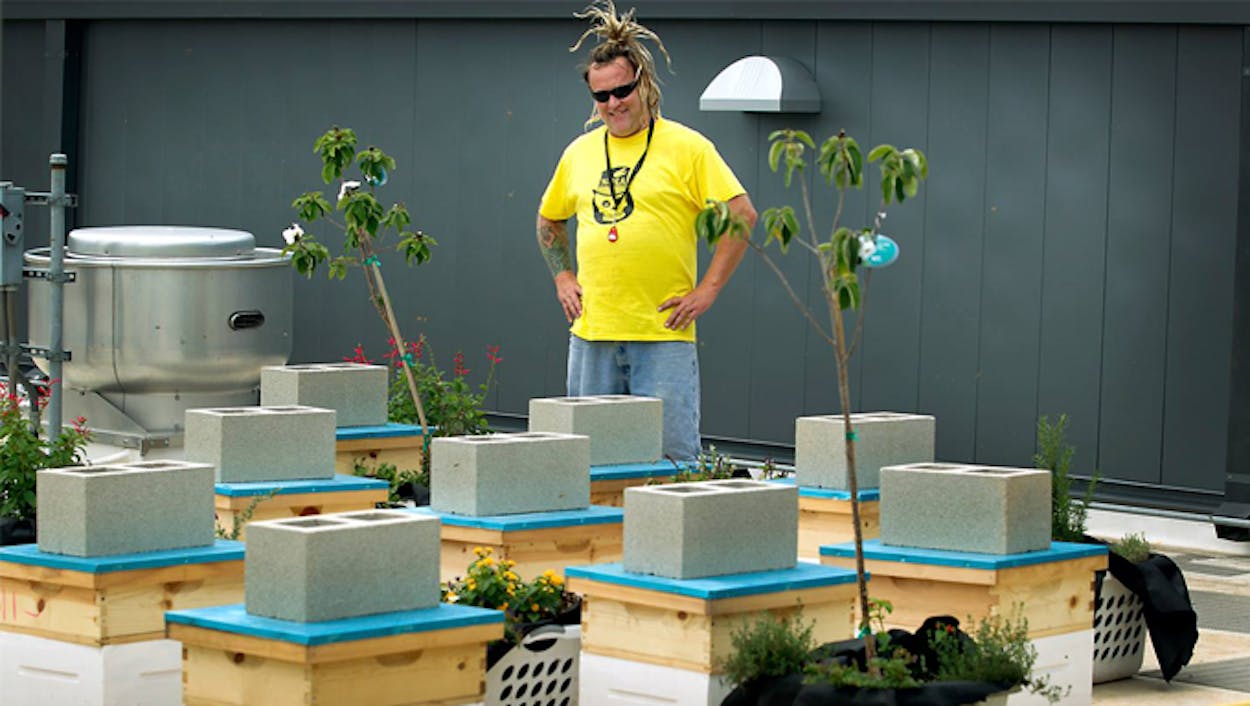Saving bees from people and people from bees,” Walter Schumacher told me, explaining the credo he adopted eight years ago, when he founded the Central Texas Bee Rescue (CTBR), a “no-kill” beekeeping nonprofit. Bees and humans share a symbiotic relationship—we all know that without the “birds and the . . . ,” we wouldn’t have any pollination—but as anyone who has been stung by a bee can tell you, there’s also an adversarial quality to that relationship.
It’s easy to argue that bees fall into the “necessary evil” category, and while Schumacher probably wouldn’t characterize the insects as ill-intentioned, he understands the reluctance people have to letting the bugs make their home a habitat. To that end he and his team of busy beekeepers drive around the state’s urban hubs and rural back roads, relocating unwanted bee colonies—free of charge—to areas where they’ll be unbothered and left to thrive and prosper.
“When I started, everyone else was doing exterminations,” he says. “I realized we weren’t the ones that needed to be protected from bees. It was the other way around.”
CTBR has installed some of their apiaries—man-made nesting blocks, which house up to 100,000 bees and pounds of pollen, wax, and honey—at some of Austin’s finest real estate. In 2013 the team erected an apiary on the W Hotel’s roof. The Governor’s Mansion and the Formula One racetrack have also agreed to house CTBR’s bee motels. And this April, Schumacher penned a deal with Omni Hotels to install more than one hundred apiaries on the hotel’s various properties.
Schumacher sweetened the deal, so to speak, for his partners by allowing these places to source the raw honey his hives create (the W and its attached restaurant, Trace, both incorporate the hyper-local ingredient into their menus). But most of the nectar collected from the CTBR’s rehabilitated hives is sold under the Wild Honey brand, which uses profits to further sustain CTBR’s no-kill bee removals.
It was actually a foodie who turned Schumacher on to the idea of bee rescue. Schumacher used to be the chef of Alice’s Restaurant, a now-shuttered restaurant in Austin. “This customer, a guy we called Hippie Dave, had this idea of saving the world through bees,” Schumacher said. “I wasn’t sure what I was getting myself into when I agreed to go into beekeeping, but I was curious to see it through. He quit three days after we founded the bee rescue, but I’ve been with it ever since.”
Just two hive extractions into his new life, a tragedy hastened along Schumacher’s nascent career. An elderly Pflugerville man was stung to death by a swarm of bees, and suddenly media outlets were flocking to Schumacher for information on his no-kill extractions. That’s when the bee advocate immersed himself in learning more about the species, to become a sort of emissary between people and bees.
And there’s never been a greater need for such a role. According to the U.S. Department of Agriculture, the honeybee population has been declining at an alarming rate over the past few decades. In 1947 the U.S. had as many as 6 million honeybee colonies; today, that number has fallen to an estimated 2.5 million colonies. This phenomenon, called colony collapse disorder, is caused by a variety of reasons, including parasitic mites, bacterial and viral diseases, exposure to pesticides, and management practices. And while research to salvage honeybees is ongoing, the USDA fears their extinction.
But there has been a years-long, informal media campaign to draw attention to this issue. Several documentaries—including Vanishing of the Bees, Queen of the Sun, and More Than Honey—have addressed colony collapse disorder, and innumerable articles and papers have been written on the subject. And given the enormous implications of a world without bees, it’s a topic worth discussing on a global level.
As Dr. Juliana Rangel-Posada, assistant professor of apiculture and researcher at the honeybee lab at Texas A&M University, points out, these insects affect both our ecological and economical worlds. According to Rangel-Posada, bees contribute $12 billion to $15 billion to our economy each year and pollinate about a third of the foods we consume. Without bees we could lose a large chunk of our food supply.
Despite this knowledge, hive exterminations are still practiced freely, Schumacher said. “There are a lot of people that are afraid of bees, but what they don’t realize is that they, too, are contributing to a greater problem when they choose to exterminate them instead of save them.”
Though he can’t single-handedly stop bees from dying off, Schumacher has focused instead on cultivating a symbiotic relationship between honeybees and our species through education. CTBR has created beekeeping classes in schools like Austin Montessori School and Clifton Career Development School, where children can learn more about both the craft and the creature. “Teaching the next generation is the key,” he said. “The enlightenment of their population will change the way we treat bees in the future.”
Schumacher’s team is also introducing a beekeeping class at the Travis County Correctional Complex in Del Valle, where a group of nonviolent inmates who are about to re-enter society will have the chance to learn beekeeping skills. “These are [people] who have had a few missteps and need someone to invest in them. This program will give them that opportunity.”
Standing in the presence of one of Schumacher’s bee apiary colonies is hypnotizing. Nearby pots and planters full of verdant plants and fragrant herbs like climbing spinach, olive peppers, marigolds, garlic chives, and figs are buzzing with the insects. Queen bees are nestled in their hives. Honey drips from the combs the bees build. And though there’s no silver-bullet solution to saving these creatures, perhaps the CTBR’s efforts to change the way we view them is a good place to start.
“We have a ways to go,” Schumacher said. “But people are starting to wake up and realize some real changes need to be made.”






